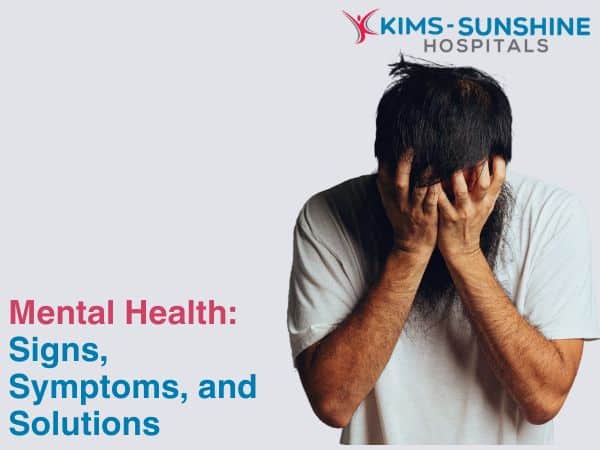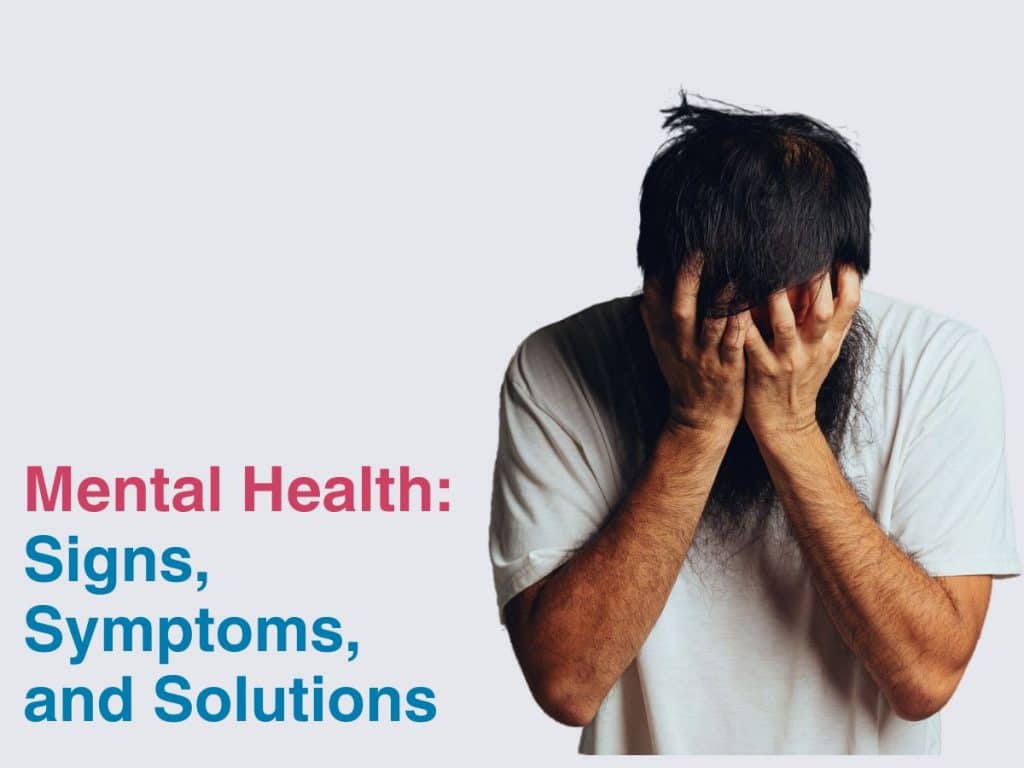
Mental Health: Signs, Symptoms, and Solutions

If someone were to yell: Pls help, I hurt my leg.
I’m sure most of us would go rushing to the scene to help.
But, let’s assume someone yelled: I feel nothing, I feel empty, please help!
Most of us would assume the person is crazy or that this is their personal problem and go about our lives.
This is the sad reality that we face.
Mental health isn’t taken seriously.
How many times have people said they’re having suicidal thoughts only for them to be brushed aside?
In fact, most people who end up making such drastic decisions communicate their intentions to people around them beforehand.
Meaning, that if taken seriously, many of these unfortunate events can be avoided.
Our mental health is just as important as our physical health, yet it’s often overlooked or stigmatized.
However, taking care of our emotional well-being is crucial for living a fulfilling life.
In this article, we’ll explore the signs and symptoms of mental health disorders, as well as practical solutions to help you or your loved ones cope with these challenges.
How to Identify Mental Health Disorders
Mental health disorders can manifest in various ways, and it’s essential to recognize the early signs. Some common symptoms include:
Persistent Sadness: Feeling down or hopeless for extended periods.
Anxiety: Constant worry or fear that interferes with daily activities.
Irritability: Frequent mood swings or anger.
Changes in Sleep Patterns or Appetite: Insomnia, oversleeping, loss of appetite, or overeating.
Loss of Interest: No longer finding joy in activities you once enjoyed.
Difficulty Concentrating: Trouble focusing on tasks or making decisions.
It’s important to note that everyone experiences these feelings occasionally.
However, if they persist and interfere with your daily life, it may be an indication of an underlying mental health issue.
Early Symptoms of Mental Health Problems
Early symptoms of mental health problems can be subtle and often go unnoticed.
Pay attention to changes in your behavior, mood, or thought patterns.
For example, you may feel overwhelmed or find it challenging to cope with everyday situations.
Unexplained physical symptoms like headaches or stomach issues may also be signs of an underlying mental health condition.
Natural Remedies for Mental Health Symptoms
While professional treatment is essential for some mental health disorders, there are also natural remedies that can help alleviate symptoms.
Regular Exercise: Physical activity releases endorphins, which can improve mood.
Mindfulness Practices: Meditation, yoga, and deep breathing exercises can reduce stress and anxiety.
Spending Time in Nature: Being outdoors can have a calming effect on the mind.
Healthy Diet: Nutrient-rich foods support brain function and reduce inflammation, which has been linked to mental health issues.
Steps to Improve Mental Health
Taking proactive steps to improve your mental health can have a profound impact on your overall well-being. Here are some tips:
Build a Support System: Surround yourself with friends and family members who you can confide in.
Practice Stress Management: Techniques like deep breathing exercises, journaling, or engaging in hobbies can help.
Engage in Joyful Activities: Participate in activities that bring you happiness and a sense of purpose.
Seek Professional Help: Remember, seeking help is a sign of strength, not weakness.
Dealing with Anxiety and Depression Symptoms
Anxiety and depression are two of the most common mental health disorders, and their symptoms can be debilitating.
If you’re experiencing persistent feelings of worry, restlessness, or sadness, it’s important to address them promptly.
Cognitive-behavioral therapy (CBT) and medication (if prescribed by a professional) can be effective in managing these conditions.
Additionally, lifestyle changes like regular exercise and a balanced diet can help alleviate symptoms.
Therapies for Mental Health Recovery
There are various types of therapy that can aid in mental health recovery, depending on the specific condition and individual needs.
Cognitive-Behavioral Therapy (CBT): Helps identify and change unhealthy thought patterns.
Psychotherapy: Provides a safe space to explore emotions and develop coping strategies.
Support Groups: Offer a sense of community and shared understanding.
When to Seek Help for Mental Health Issues
If you or a loved one is experiencing severe or persistent symptoms of a mental health disorder, it’s crucial to seek professional help.
Don’t hesitate to reach out to a therapist, counselor, or your primary care physician. They can provide you with the support and resources you need to start your journey toward better mental health.
Conclusion
Taking care of your mental health is a vital aspect of overall well-being. Recognizing the signs and symptoms of mental health issues, seeking appropriate help, and incorporating healthy lifestyle changes can make a significant difference. Remember, you are not alone in this journey. By being proactive, reaching out for support, and practicing self-care, you can enhance your mental health and lead a more fulfilling life. Prioritize your emotional well-being and take the steps necessary to nurture your mind, just as you would your body.
Frequently Asked Questions

Dr. Shiwani Kohli
M.Phil (Clinical Psychology), PhD (Research Scholar),
Masters (Clinical Psychology), PG Diploma (Counselling Psychology)
Clinical Psychologist






